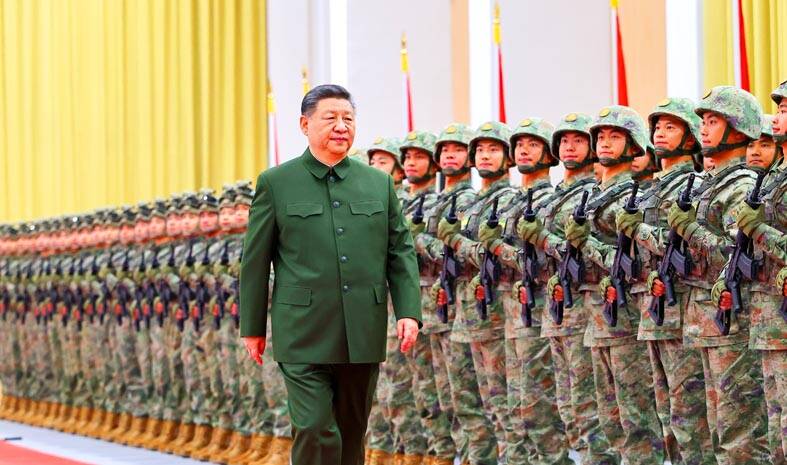China’s defense spending is to rise 7.2 percent this year, the same as last year, Beijing said yesterday, as its armed forces undergo rapid modernization and eye deepening strategic competition with the US.
The country’s expenditure on its armed forces has been on the rise for decades, broadly in line with economic growth.
China has the world’s second-largest military budget, but lags well behind the US, its primary strategic rival.

Photo: EPA-EFE
Despite that, the Chinese People’s Liberation Army (PLA) surpasses the US military by number of personnel.
Beijing’s 1.78 trillion yuan (US$245.3 billion) defense budget for this year is still less than one-third of Washington’s.
China’s military spending last year made up 1.6 percent of its GDP, far less than the US or Russia, the Stockholm International Peace Research Institute said.
However, its defense expansion is viewed with suspicion by Washington, as well as other powers in the region, including Japan, with which Beijing has a territorial dispute over islands in the East China Sea.
China has also increasingly flexed its muscles in the South China Sea, which it claims almost entirely despite an international arbitration ruling that declared its stance baseless. Taiwan also has claims in the South China Sea.
Beijing’s spending boost is also a cause for concern for Taiwan.
The hike took place in the context of “growing uncertainties in China’s external environment and domestic security priorities,” National University of Singapore associate professor Huang Chin-hao said.
“The defense budget increase reflects the need to maintain and upgrade the PLA’s military capabilities to keep pace and be ready for all contingencies,” he said.

‘ABUSE OF POWER’: Lee Chun-yi allegedly used a Control Yuan vehicle to transport his dog to a pet grooming salon and take his wife to restaurants, media reports said Control Yuan Secretary-General Lee Chun-yi (李俊俋) resigned on Sunday night, admitting that he had misused a government vehicle, as reported by the media. Control Yuan Vice President Lee Hung-chun (李鴻鈞) yesterday apologized to the public over the issue. The watchdog body would follow up on similar accusations made by the Chinese Nationalist Party (KMT) and would investigate the alleged misuse of government vehicles by three other Control Yuan members: Su Li-chiung (蘇麗瓊), Lin Yu-jung (林郁容) and Wang Jung-chang (王榮璋), Lee Hung-chun said. Lee Chun-yi in a statement apologized for using a Control Yuan vehicle to transport his dog to a

BEIJING’S ‘PAWN’: ‘We, as Chinese, should never forget our roots, history, culture,’ Want Want Holdings general manager Tsai Wang-ting said at a summit in China The Mainland Affairs Council (MAC) yesterday condemned Want Want China Times Media Group (旺旺中時媒體集團) for making comments at the Cross-Strait Chinese Culture Summit that it said have damaged Taiwan’s sovereignty, adding that it would investigate if the group had colluded with China in the matter and contravened cross-strait regulations. The council issued a statement after Want Want Holdings (旺旺集團有限公司) general manager Tsai Wang-ting (蔡旺庭), the third son of the group’s founder, Tsai Eng-meng (蔡衍明), said at the summit last week that the group originated in “Chinese Taiwan,” and has developed and prospered in “the motherland.” “We, as Chinese, should never

‘A SURVIVAL QUESTION’: US officials have been urging the opposition KMT and TPP not to block defense spending, especially the special defense budget, an official said The US plans to ramp up weapons sales to Taiwan to a level exceeding US President Donald Trump’s first term as part of an effort to deter China as it intensifies military pressure on the nation, two US officials said on condition of anonymity. If US arms sales do accelerate, it could ease worries about the extent of Trump’s commitment to Taiwan. It would also add new friction to the tense US-China relationship. The officials said they expect US approvals for weapons sales to Taiwan over the next four years to surpass those in Trump’s first term, with one of them saying

INDO-PACIFIC REGION: Royal Navy ships exercise the right of freedom of navigation, including in the Taiwan Strait and South China Sea, the UK’s Tony Radakin told a summit Freedom of navigation in the Indo-Pacific region is as important as it is in the English Channel, British Chief of the Defence Staff Admiral Tony Radakin said at a summit in Singapore on Saturday. The remark came as the British Royal Navy’s flagship aircraft carrier, the HMS Prince of Wales, is on an eight-month deployment to the Indo-Pacific region as head of an international carrier strike group. “Upholding the UN Convention on the Law of the Sea, and with it, the principles of the freedom of navigation, in this part of the world matters to us just as it matters in the